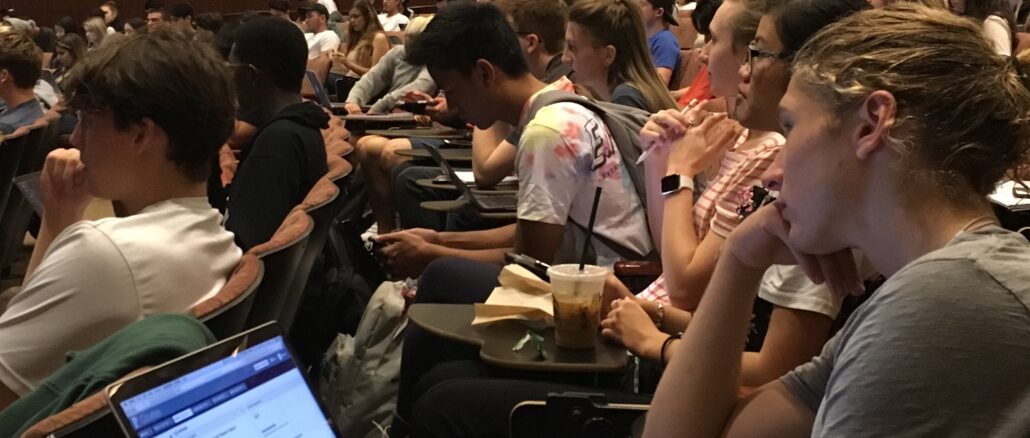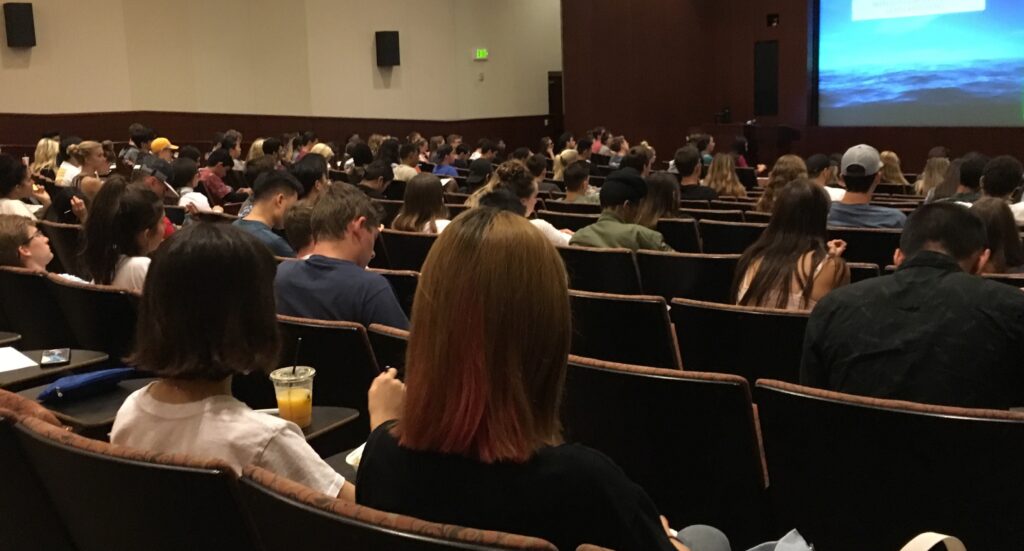
What faculty intend for students to gain from general education courses does not align with what students say they learn.
The faculty overall hope that students go in with an open mind, learn new material, new ways to think about life and new things about themselves. Many students see GE courses as hurdles they must clear before they can concentrate on their majors.
“We hear some disappointing phrases,” said Jay Brewster, the divisional dean of Natural Sciences and a biology professor. “‘I’m getting my GEs out of the way.’ That’s a common one.”
A Pepp Post poll of 57 students and interviews with a dozen has shown resentment against GEs grows with each academic year with humanities getting the most dislike across the board. Students weigh in on what they would change or add as the university prepares to reassess the entire GE program with the entry of a new associate dean.
Student opinion on the value of their GE classes is incredibly mixed.
The Pepp Post poll asked students to rank their GEs as very useful, neutral or not very useful. Based on students who had completed a course, students considered political science the most useful, then language, and psychology and public speaking and rhetoric was tied for third.
The poll found that students were divided on some classes, with roughly 40 percent liking the class and about 40 percent disliking. These courses were Religion 101, Religion 301, fine arts and sociology.
Students overwhelmingly found Humanities 111 and Humanities 212 to be unuseful, with Humanities 313 being only slightly more favored.
In another question, students said they most wanted to axe the various humanities courses. Out of the 57 students, more than 50 percent wanted to get rid each class in the sequence.
Andrea Harris, the senior director of Student Administrative Services, said many students come in with a mindset that the classes are not necessary.
“It has less to do with the material,” Harris said. “Just the association, that oh, it’s a GE and it’s in Elkins.”
Senior psychology major Mollie Vandenberg said she had mixed feelings for her GEs.
“There are some that I never would have taken on my own and I’m glad I did,” Vandenberg. “There were others I wasn’t so fond of.”
Junior chemistry major Matt Doughty said the range of opinion didn’t surprise him. “You’d always have your favorite classes and what you want to focus on like high school,” he said. “My basic understanding, there’d be classes I did like and classes I wouldn’t like.”
Students get more cynical of GEs as they advance into their junior and senior years.
Junior theatre major Morris Chen said that how upperclassmen spoke about GEs had an impact on his viewpoint of the courses.
“Anytime someone talks about GEs they have a negative outlook,” he said. “When someone says, ‘I’m a junior, I’m a senior, and I’m done with my GEs.”
GEs level the playing field
The poll and interviews found most students had a basic understanding that GE courses intended to make them a well-rounded individual.
“I knew that Pepperdine was a liberal arts college,” junior finance major Conner Brase said. “But I didn’t necessarily know the extent to what the GEs would require of me.”
Most students interviewed agreed that GEs leveled the knowledge of everyone at Pepperdine – for better or for worse.
“I have not had a class so far as a GE that I have not learned in high school,” Brase said. “A lot of it has been repetitive and a waste of my time.”
Others find it very beneficial. Chen is from Taiwan and appreciated the political science class.
“I had been trying to understand American politics,” Chen said. “That was a good introduction to the United States for me.”
Why professors find them important
Professors and staff agreed that the GE classes help students become well-rounded, knowledgeable citizens.
“You can have your eyes opened and experience things that you never would have otherwise experienced,” Harris said. “It gives students here depth.”
Roughly 91 percent of employers surveyed regarded a potential employee’s demonstration of critical thinking, clear communication and complex problem solving more important than the potential employee’s undergraduate major, according to research by the Association of American Colleges and Universities.
Michael Ditmore, the divisional dean of Humanities and Teacher Education, said the general education program is intended to make students better citizens and provide them with knowledge in a variety of areas.
“A bedrock kind of way of getting your feet into a lot of things you might not do otherwise,” he said. “When you get out of college, 10 or 15 or 20 years you can see more and more the advantages you accrue from that.”
Pepperdine’s regional accreditors, the Western Association for Schools and Colleges, sets five core competencies that Pepperdine attempts to fulfill with its GE program. These core competencies are writing, oral communication, quantitative reasoning, information literacy and critical thinking. Bradley Griffin, the divisional dean of Fine Arts said he is currently writing a report on how these are fulfilled at Pepperdine and the areas that could be strengthened. These skills are necessary in every occupation a student might pursue.
Beth Smith, from the Academic Senate of California Community Colleges, argued in an essays that everyday activities such as filling out a ballot, speaking in the workplace and even parenting have knowledge bases in general education courses.
Humanities

The GEs students dislike most is the three-course humanities sequence. As the sequence starts with a large class in Elkins Auditorium, many find it hard to pay attention and are disinterested in the material.
“I think that going through the humanities courses changes everyone’s opinion on GEs,” said Shyann Ford, a senior film studies and media production contract major.
The poll found that more than 50 percent of students surveyed found the humanities classes to be unuseful and wanted to axe the entire humanities sequence.
Courses people want to axe
“I know Pepperdine is a liberal arts college, but I feel like humanities and history,” Doughty said. “Those are stuff you take a ton of in high school and middle school and you know about that. … I feel you only need two semesters and that’s enough. It’s four total and that’s a little too much.”
David Holmes, the associate dean of General Education and Curriculum, said learning could go deeper with a topic each time if you went in with an open mind.
“I don’t believe it’s repetition,” Holmes said. “If you talk about the same thing in different ways … expansive ways.”
Ditmore said the feedback he receives each semester from course evaluations is so varied that it is difficult to know what areas need to be addressed.
“Some students will complain that some courses are way too hard ‘for a GE course,’” Ditmore said. “But other students will also complain they’re not really that hard.”
Students take advantage of AP courses to get out of GEs
Pepperdine’s requirements for incoming credits allows for some people to opt out of classes such as math, foreign language or psychology. But one concern that many students brought up in the Pepp Post poll and in interviews was that not all of their AP, IB or dual enrollment credits would transfer. The course that students had the most difficulty transferring in was humanities. Pepperdine requires four western civilization courses of AP or dual enrollment to cover the three courses in the humanities sequence.
In comparison, Notre Dame, a Roman Catholic liberal arts university Pepperdine considers a model in Christian liberal arts education, does not allow any AP courses to count for their GE courses.
Many students, such as Ford, have taken AP, IB or dual enrollment classes to limit the number of GEs they had to take in college.
The poll found that over 87 percent of respondents took courses in high school to lessen the amount of GEs they had to take.
“I did plan for them with AP courses,” Ford said. “I tried to come in with as many units to get rid of GEs as possible.”
Because of her AP courses, Ford did not have to do many GE courses. She will be graduating a semester early and is thankful for not having to pay for an additional semester.
However, transferring in credits does not help everyone. Angie Wurm, a senior business administration major, is graduating a semester late because of the humanities classes.
“I knew some about the religion classes that were required,” Wurm said. “But it wasn’t until I got here that I knew three humanities classes were required as well, so that was a little shocking. But when I transferred, because of those classes, it added on an additional semester.”
Catherine Munzar, a freshman math/computer science major, came into Pepperdine with similar hopes as Ford.
“APs can get you out of some of them,” she said. “This is why people do APs, because no one wants to do GEs.”
Rachel Stull, a first-year integrated marketing communication major, brought 62 credits in with her, classifying her as a junior.
“I went to a community college,” she said, “and got a bunch of credits out of the way.”
Percentage of students who took AP, IB or dual enrollment courses
Praises about GEs
Harris said a large part of Pepperdine’s GE program is the connections students make with a professor. Save a few large Elkins lectures, Pepperdine boasts smaller class sizes granting these opportunities for stronger connections.
Professors were the one aspect interviewees appreciated the most about their GEs. Communication 180, public speaking and rhetoric, was a common favorite among interviewees and they all said it was because of the professor – different ones.
“I like my Com 180 class a lot but it’s mostly ‘cause the teacher’s good,” freshman sociology major Bryn Sandine said.
Sandine was surprised that her speech class was so enjoyable and was sad that Sociology 200 was an Elkins class. Though it is her major, she finds it a little bit boring.
“It’s really big,” Sandine said. “It can be very distracting, cause you can sit with your friends.”
Samson Lim, a sophomore sports medicine major, also appreciated his public speaking class.
“I have favorites because of the professor,” Lim said. “I really liked Com 180 with Barry Fike. Even though it was very demanding, it was fun. He was an amazing professor.”
Vandenberg was apathetic to most of the courses as she went through them. She realized the importance of most courses after the fact, and said she appreciates the way they have provided a well-rounded education.
“Overall, beneficial,” she said. “You want a well-rounded education even if it sucks sometimes. … I’m happy I did it even though it wasn’t great for a lot of them.”
How Pepperdine compares
In the interviews, many students thought that Pepperdine had too many GEs and that Pepperdine had more than most other schools.
Pepperdine has 19 GE courses adding up to 63-64 GE units.. The recommended load of courses is 15 units a semester, which means that the GE requirements add up to approximately four semesters or half of a student’s college education.
“Usually students that are frustrated with the GE are frustrated with the number of units in the GE,” Brewster said. “We have more units in the GE than the typical liberal arts school.”
In comparison with other Church of Christ affiliated schools, Pepperdine is slightly higher than Abilene Christian University, and over 10 units greater than Lipscomb University and Harding University. Abilene has 56 required units, while Harding has 53 units and Lipscomb has 47 units.
Peer institutions University of Southern California and Notre Dame focus on course requirements rather than units. USC has eight classes across six core literacy sections and two global perspectives courses. Students must also take two writing classes, for a total of 12 courses.
Notre Dame recently changed their GE curriculum with the new program going into effect this fall. Their new program has six courses in the general liberal arts, four courses in Catholic dimensions of liberal arts, two courses in writing and two semesters of a first-year experience. Additionally, they no longer allow AP courses to cover their GE courses.
The unit minimums for GE courses varies at UCLA, depending on a person’s major. Engineering and applied science majors have the lowest unit amount at 24. Their arts and architecture/music programs require 38 minimum units, while letters and science, and nursing require the most at 48 units.
Upcoming changes
When asked, most students said Pepperdine should not add any more GEs; many said there were too many already. However, some Pepperdine students requested a course that had more practical knowledge.
“I think budgeting is very important, and that’s what I took for my first-year seminar,” Doughty said. “They should make it more a one semester GE. An economics class on just simply basic budgeting and responsibilities with money and finances.”
Other students have request a cultural competency class, Allison Lee wrote in an October 2017 Graphic article. Seaver created a task force, which Holmes was a part of, to look into the possibilities. A Graphic editorial spoke out on how to incorporate cultural competency into Pepperdine’s program without adding a GE in February 2018.
Holmes said the university will create a committee next semester to look through Pepperdine’s requirements. They will analyze how Pepperdine compares to other schools and check how the courses the university currently offers serve the student population and align with Pepperdine’s mission statement.
“It will be tasked with looking not only at cultural competency but primarily tasked with looking at the entire GE program,” Holmes said. “Then and only then will suggestions begin to be made about what changes will take place.”
Carlie Ott completed the reporting for this story under the supervision of Dr. Christina Littlefield and Dr. Theresa de los Santos in Jour 241 in fall 2018. Dr. Littlefield supervised the web story.




